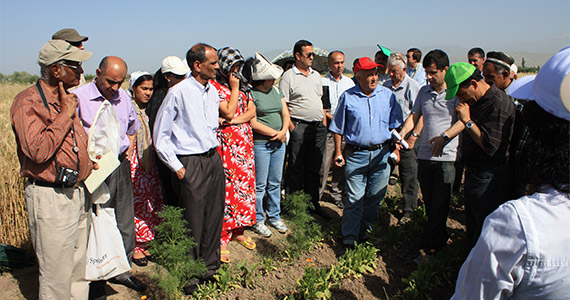
When faced with the threat of pest infestation, farmers in Central Asia still count largely on the conventional method; they use chemicals. But as more and more producers in the region become increasingly mindful of the cost of inputs like pesticides, they start looking for better ways of controlling pests. And scientists try to help farmers to break free from inefficient agricultural practices of the past and increase their awareness of the toll heavy use of pesticides takes on human health and the environment. Limiting use of pesticides as much as possible would also help farmers save more. More importantly, this will contribute to making agriculture in the region more sustainable, a goal shared by national and international research and development organizations.
This idea was also behind a multi-year USAID-funded regional program on integrated pest management (IPM) in Central Asia. Its achievements and results were discussed at a final workshop in Dushanbe, Tajikistan, on 22-24 August 2014. The event brought together some 50 IPM and agricultural scientists from the Tajik Academy of Agricultural Sciences, the Kyrgyz Academy of Science, Michigan State University, University of California, Davis, International Center for Agricultural Research in the Dry Areas (ICARDA) and other organizations.
IPM is an ecosystem-based approach to growing healthy crops and minimizing the use of pesticides. It is a set of different management strategies and practices rather than a single method and is considered a pillar of both sustainable intensification of crop production and pesticide risk reduction. The program was launched in 2005 to promote the development of a comprehensive IPM initiative in Central Asia. In addition to national partners, the program collaborators included Virginia Tech University, Michigan State University, University of California, Davis, Kansas State University andICARDA.
The objectives of the program were twofold: to institutionalize IPM in the region and to develop specific IPM strategies and practices for key food crops. During the first phase from 2005 to 2009, the program worked to set the scene for wider adoption of IPM in farming. It focused on three components. First, it aimed at enhancing the efficiency and product lines of biolaboratories in the three target countries: Kyrgyzstan, Tajikistan and Uzbekistan. Enhancing biological control of pests through landscape ecology/habitat management, and strengthening IPM outreach and education, were additional key areas of work. Through training, networking and institutional capacity-building, the program helped to increase the use of ecologically-based IPM practices in research, teaching and outreach/extension programs in Central Asia.
The second phase, which started in 2010 and finished recently, aimed to get IPM into the field. Scientists developed ecologically-based IPM strategies and practices for wheat, tomato and potato through collaborative research. In particular, several IPM practices were introduced to farmers and end-users through technology transfer and outreach programs in collaboration with local NGOs and government institutions. These practices included information on plant variety selection for disease and pest resistance, bio-pesticides, pheromone traps, sticky traps, crop rotation and planting dates, and flowering plants which attract beneficial insects for enhancing biological control.
As a result of the outreach and extension component of the program, more than 1,500 farmers were trained (30 per cent of them were women) in ecologically-based IPM practices. A total of 16 IPM specialists from five Central Asian countries completed a short course on Agroecology, Integrated Pest Management and Sustainable Agriculture at Michigan State University. More than 50 publications were developed and around 15,000 copies of extension materials such as leaflets, brochures, proceedings, scientific papers and books on various aspects of IPM in tomato, wheat and potato crops were distributed to various stakeholders in the region. What is more, the program established a Central Asia IPM Knowledge Network to ensure continued knowledge transfer and cooperation between national and US institutions, and international agricultural research centers.
Researchers hope that as more farmers adopt IPM practices, they will be able to keep pests off their fields, contribute to sustainable agricultural production and earn more. Since, unlike in the Soviet past, today it is farmers who bear the cost of production, economic and other benefits offered by IPM are likely to trigger more interest and adoption.
More information on the program can be found at http://www.ipm.msu.edu.